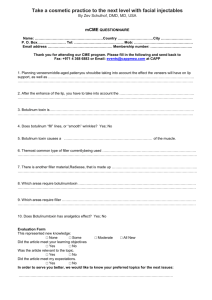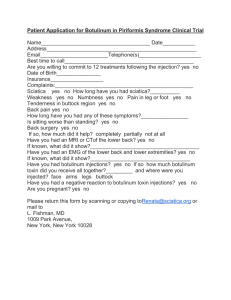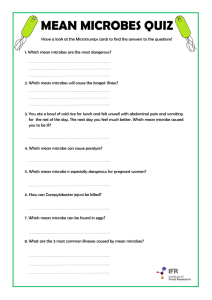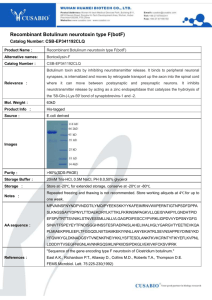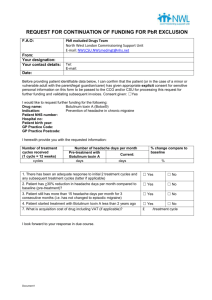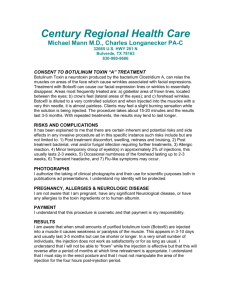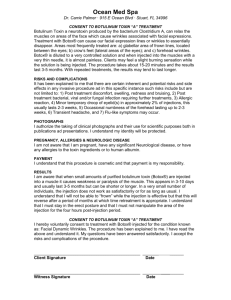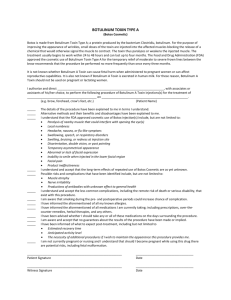Week 6 paperMPH525
advertisement
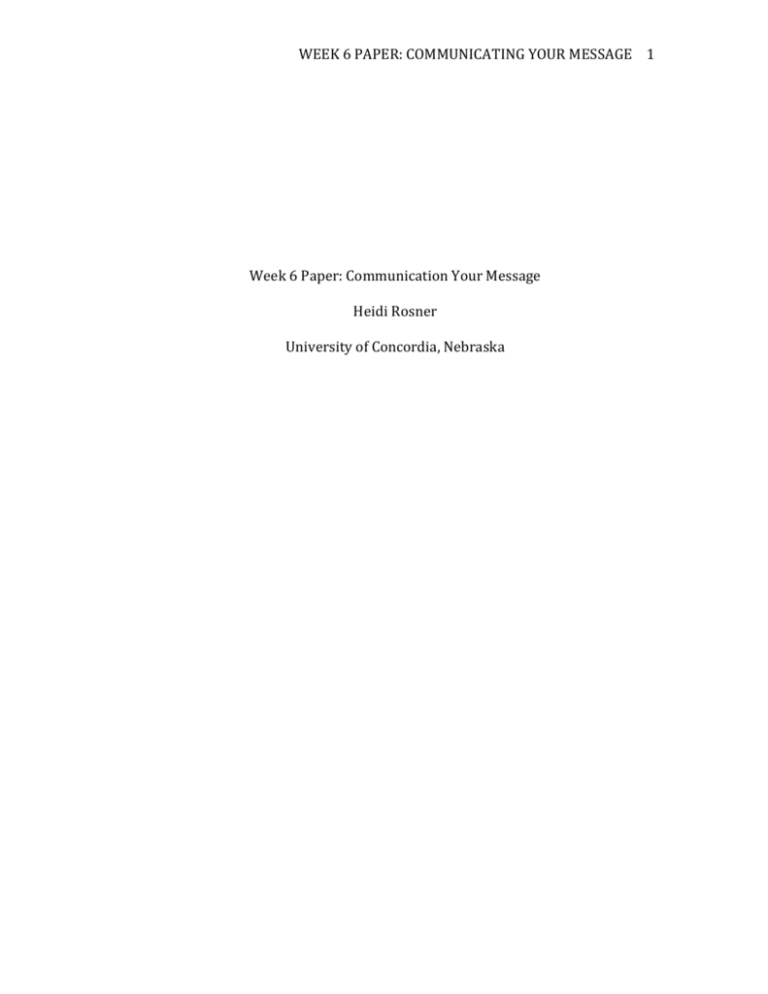
WEEK 6 PAPER: COMMUNICATING YOUR MESSAGE 1 Week 6 Paper: Communication Your Message Heidi Rosner University of Concordia, Nebraska WEEK 6 PAPER: COMMUNICATING YOUR MESSAGE 2 One of the most poisonous biological substances known, Clostridium botulinum, is a neurotoxin commonly found on plants, in soil, water and in the intestinal tract of animals. C. Botulinum interferes with neural transmitters in the body. (Nigam and Nigam, 2010) This microbe has a high resistance to heat, and results in food poisoning from ingesting food or water containing preformed toxins produced by the microbe. (“Clostridium Botulinum”, 2012) In the case of the water source feeding a community being contaminated with botulinum toxin, it would be an important message to first notify the community of the contamination. First, to get the issue to the public there will need to be a formal announcement by a reputable source that there was an evidence based detection of botulinum toxin in the community water supply. The announcement will be for media and news outlets of different kinds. This will effectively reach the target audience. (“Communication for”, 2007) To reach the whole community it is important to use different forms of media both electronic and paper. Older generations tend to use paper media to gain information while younger ones use electronic media. There is still a digital divide that needs to be taken into consideration. (“Communication for”, 2007) While using media to report, it is important to not spark to much excitement or panic. By providing information about symptoms and transmission, panic will be reduced because people will have an idea of what to expect. The demographic of this community is anyone that does not exclusively use filtered water, which assembly could be everyone within the water supply. There WEEK 6 PAPER: COMMUNICATING YOUR MESSAGE 3 are many exposers to tap water that are not related to drinking. The methods to reach the community are through media, which is a cheaper option than door to door. Door to door/snail mail city notices are another option to reach those affected ensuring that those that are not connected to media are aware of the contamination. It is important to give people a large body of information on what botulinum toxin is and the signs and symptoms of infection. It is also important to include safe alternative and water treatment to ensure safely eliminating threats. Providing locations that provide safe drinking water, especially in lower income areas of the effected area, that will help with compliance of not drinking contaminated water. The idea of persuasion theory plays into this scenario through the fact that it is important to persuade the community that this is a real treat and that it is important to not use the water supply. Instead of just giving the public information about the contamination, persuasion is used to then enacted a change in behavior in the community: stop drinking the water. Like earlier discussed, in this kind of public health crisis, media is an important role. This is where mass communication theory comes into play. This takes into account that it is not a reliance of word of mouth transmission of information but the use of large-scale publication of information to a general public. Managing the crisis is a crucial part to communicating the message of the contamination. Effectively isolating the source of the contamination and preventing further contamination are hand in hand. Communicating to the community ways that water becomes contaminated is a method for management of the contamination, such things as not over watering lawns and gardens, proper disposal WEEK 6 PAPER: COMMUNICATING YOUR MESSAGE 4 of trash and recyclables, helping to identify and report polluters in the area, are all ways that can be communicated as helping keep water unpolluted. (“How to”, 2012) Some public health resources for this kind of outbreak would be the WHO, Natural Resources Defense Council, the CDC, and local governments and associated environmental health departments. These organizations can also provide help in communicating with media and the community. Overall, it is important to notify as many people in the community that the water supplies. The biggest method for communicating is the media and local news outlets. It is important to use the public health departments and structures to ensure the containment of the contamination of botulinum toxin that was found to be present in the water. WEEK 6 PAPER: COMMUNICATING YOUR MESSAGE 5 Resources Angeli, E., Wagner, J., Lawrick, E., Moore, K., Anderson, M., Soderlund, L., & Brizee, A. (2010, May 5). General format. Retrieved from http://owl.english.purdue.edu/owl/resource/560/01 Communication for policy change. (2007). Grant Makers in Health, (29), lii-lii. Retrieved from https://engage.cune.edu/learn/pluginfile.php/34703/mod_page/content/1 2/W6_Communication_for_policy_change.pdf Clostridium Botulinum. (2012). In Mosby's dictionary of Medicine, Nursing & Health professions. Philadelphia, PA: Elsevier Health Sciences. Retrieved from http://search.credoreference.com.contentproxy.phoenix.edu/content/entry/ ehsmosbymed/clostridium_botulinum/0 How to Clean Up Our Water. (2012, August 22). Retrieved from http://www.nrdc.org/water/pollution/gsteps.asp Nigam, P., & Nigam, A. (2010). Botulinum toxin. Indian Journal of Dermatology, 55(1), 8-14. doi:http://dx.doi.org/10.4103/0019-5154.60343
